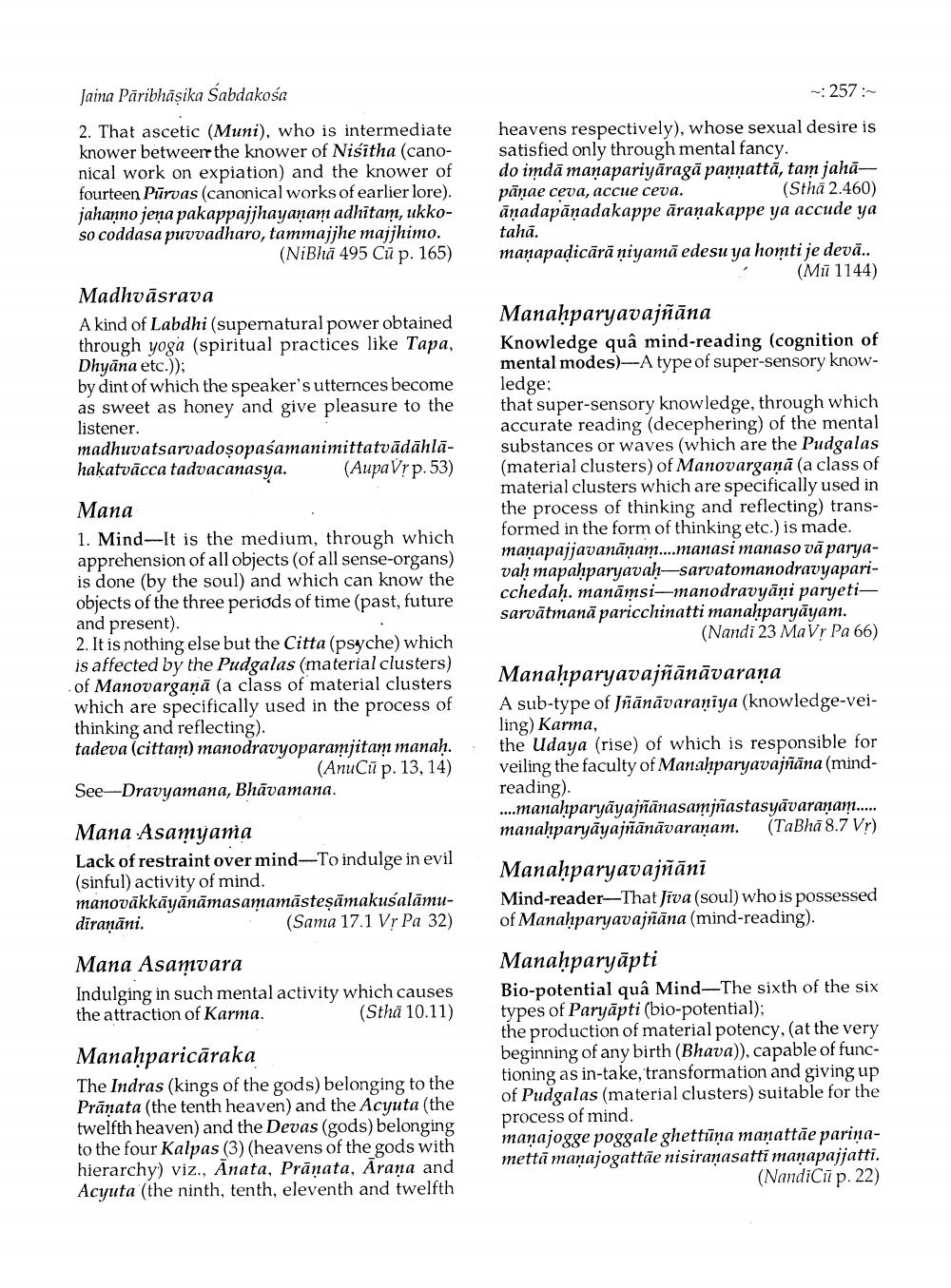________________
Jaina Pāribhāṣika Sabdakosa
2. That ascetic (Muni), who is intermediate knower betweer the knower of Nisitha (canonical work on expiation) and the knower of fourteen Pürvas (canonical works of earlier lore). jahanno jeņa pakappajjhayanam adhitam, ukkoso coddasa puvvadharo, tammajjhe majjhimo.
(NiBhá 495 Cú p. 165)
- 257: heavens respectively), whose sexual desire is satisfied only through mental fancy. do imdā maņapariyāragā pannattā, tam jahāpānae ceva, accue ceva.
(Stha 2.460) āņadapāņadakappe āranakappe ya accude ya
taha.
manapadicārā niyamā edesu ya homti je devă..
(Mū 1144)
Madhvāsrava A kind of Labdhi (supernatural power obtained through yoga (spiritual practices like Tapa, Dhyāna etc.)); by dint of which the speaker's utternces become as sweet as honey and give pleasure to the listener. madhuvatsarvadosopasamanimittatvādāhlāhakatväcca tadvacanasya. (Aupa Vrp.53)
Manahparyavajñāna Knowledge quâ mind-reading (cognition of mental modes)--A type of super-sensory knowledge; that super-sensory knowledge, through which accurate reading (decephering) of the mental substances or waves (which are the Pudgalas (material clusters) of Manovargaņā (a class of material clusters which are specifically used in the process of thinking and reflecting) transformed in the form of thinking etc.) is made. manapajjavanānam....manasi manaso vä paryavaḥ mapahparyavah-sarvatomanodravyaparicchedaḥ. manāmsi-manodravyāņi paryetisarvātmanā paricchinatti manahparyāyam.
(Nandi 23 Ma Vr Pa 66)
Mana 1. Mind--It is the medium, through which apprehension of all objects (of all sense-organs) is done (by the soul) and which can know the objects of the three periods of time (past, future and present). 2. It is nothing else but the Citta (psyche) which is affected by the Pudgalas (material clusters) .of Manovargaņā (a class of material clusters which are specifically used in the process of thinking and reflecting). tadeva (cittam) manodravyoparamjitam manaḥ.
(AnuCū p. 13, 14) See-Dravyamana, Bhāvamana.
Manahparyavajñānāvarana A sub-type of Jñānāvaraniya (knowledge-veiling) Karma, the Udaya (rise) of which is responsible for veiling the faculty of Manahparyavajñāna (mindreading). ....manahparyāyajñānasamjñastasyāvaranam..... manahparyāyajñānāvaranam. (TaBhä 8.7 Vr)
Mana Asamyama Lack of restraint over mind-To indulge in evil (sinful) activity of mind. manovākkāyānāmasamamāsteṣāmakusalāmudiraņāni.
(Sama 17.1 Vr Pa 32)
Mana Asamvara Indulging in such mental activity which causes the attraction of Karma.
(Sthā 10.11)
Manahparyavajñāni Mind-reader—That Jiva (soul) who is possessed of Manahparyavajñāna (mind-reading). Manaḥparyāpti Bio-potential quâ Mind—The sixth of the six types of Paryāpti (bio-potential); the production of material potency, (at the very beginning of any birth (Bhava)), capable of functioning as in-take, transformation and giving up of Pudgalas (material clusters) suitable for the process of mind. manajogge poggale ghettüņa manattäe parinamettă manajogattāe nisiranasatti manapajjatti.
(Nandici p. 22)
Manahparicāraka The Indras (kings of the gods) belonging to the Prānata (the tenth heaven) and the Acyuta (the twelfth heaven) and the Devas (gods) belonging to the four Kalpas (3) (heavens of the gods with hierarchy) viz., Anata, Pranata, Arana and Acyuta (the ninth, tenth, eleventh and twelfth
na mananamapaijo. 22)




